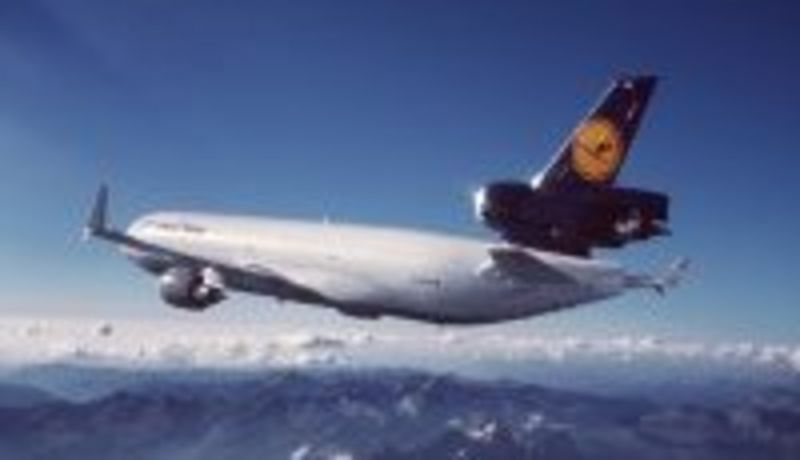Lufthansa Cargo: Strong result despite headwind
Revenues up to 2.9 billion euros / Operating profit of 249 million euros
Lufthansa Cargo returned an operating profit of 249 million euros last year, the second-best result in company history. Chairman and CEO Karl Ulrich Garnadt told a press conference in Frankfurt that the very good results for the year were achieved despite adverse operating conditions. In the present year, Lufthansa Cargo is anticipating severe pressures ensuing especially from the ongoing night-flight ban in Frankfurt. All in all, however, the company is expecting a good operating result once more at year-end.
Following record profits in 2010, the year 2011 began initially very positively. In the course of the year, however, demand declined significantly. The airlines struggled against eroding demand, especially in the major airfreight markets in China and India. “Lufthansa Cargo turned in an outstanding result in a demanding market environment,“ emphasised Chairman Karl Ulrich Garnadt. That success is chiefly attributable to cost discipline, a broad product range and flexible capacity steering dictated by demand. In the past business year, Lufthansa Cargo increasingly switched capacities from Asia to North America and included new and attractive destinations in its route network. On the back of those measures, the cargo carrier significantly boosted revenues and tonnage. Earnings rose by 5.3 per cent to 2.9 billion euros. The operating profit amounted to 249 million euros, the second-best in company history.
Chairman Karl Ulrich Garnadt pointed out that investment in new products and a strong focus on quality had also contributed to company success. “We raised our quality level markedly again during the year and attained top marks anew in all areas. We will stay on that path and further expand our quality lead.“ That is evidenced for example by our investment in the Lufthansa Cargo Cool Center for temperature-controlled shipments at Frankfurt Airport, he said.
With the “Lufthansa Cargo 2020“ programme launched last year, the company has clearly defined its long-term strategy, explained the Chairman. With orders for new Boeing 777 freighters, the upgrading of the IT platform, plans for a new logistics center in Frankfurt to replace the existing 30 year-old facility as well as other long-term projects, the key markers are in place to ensure that the company remains industry leader also in 2020.
At the same time, Lufthansa Cargo CEO Karl Ulrich Garnadt was emphatic about huge challenges confronting the airfreight industry in the coming years. The EU’s unilateral stance on emissions trading is notably hitting European airlines and distorting competition. The continuing lack of uniformity in global security standards in the air cargo business as well as the slow certification of known consignors in Germany are threatening to inhibit growth.
With all that, the principal challenge facing Lufthansa Cargo is still the possibility of a permanent ban on night flights at Frankfurt Airport. “There is a real danger of Frankfurt losing its position as the best and most attractive airfreight hub in Europe,” emphasised Garnadt. A blanket
night-flight ban of six hours, daily, would severely disadvantage the competitive standing of companies operating at the Frankfurt base. Round-the-clock handling of express cargo is imperative for those companies. A permanent night-flight ban would deprive Lufthansa Cargo alone of major express connections and cost the company a yearly 40 million euros. “Germany and the Rhine-Main region around the airport live from exports and international trade,“ Garnadt remarked. “Severing the world’s seventh biggest air cargo airport and major express hub for a quarter of a day from international goods flows would have a drastic impact on producing companies and the entire logistics industry. The victims are companies based in Frankfurt and thousands of employees.”
Moreover, Peter Gerber, Lufthansa Cargo Board Member Finance and Human Resources, pointed out that only financially healthy operators are in a position to invest in new technologies, such as quieter aircraft. “The prerequisite for that are commensurate operating conditions, allowing companies to plan long-term on a reliable basis.” Lufthansa Cargo has done its homework and is not resting on the laurels of past success. The SCORE earnings improvement programme, now underway across the entire Lufthansa Group, is also an essential lever underpinning Lufthansa Cargo’s efforts to improve the company’s cost base. “Our aim is to raise earnings by a minimum of 70 million euros yearly from 2015, Gerber announced. That will furnish the foundations for Lufthansa Cargo’s ambitious future plans.
In the initial months of the present year, Lufthansa Cargo has also found – in the Chinese Unitop logistics group – a partner for restructuring the Chinese joint-venture carrier, Jade Cargo International, in which Lufthansa Cargo holds a 25 per-cent stake, Gerber noted.
In the current year, Lufthansa Cargo will continue to concentrate on its core business, Gerber told the press conference in Frankfurt. Last year, the cargo carrier divested its stakes, among others, in Traxon Europe, a provider of electronic solutions for airlines, and LifeConEx, an expert in temperature-controlled logistics.
For the year as a whole in 2012, Lufthansa Cargo is assuming that business will develop on a positive note and is again anticipating an operating result in the region of thee-digit millions. However, it will in all probability not replicate the very strong results attained in 2011.
Key figures in fiscal 2011:
| Lufthansa Cargo | 2011 | 2010 | Change in % | |
| Revenues | In €M | 2,943 | 2,795 | +5.3 |
| Operating reuslt | In €M | 249 | 310 | -19.7 |
| Operating margin | % | 8.5 | 11.1 | -2.6pp |
| Employees as of 31.12. | Number | 4,624 | 4,517 | +2.4 |
| Freight and mail (tonnes) | In thousands | 1,885 | 1,795 | +5.0 |
| Available tonne-kilometres | In millions | 13,647 | 12,564 | +8.6 |
| Revenue tonne-kilometres | In millions | 9,487 | 8,905 | +6.5 |
| Cargo load factor | % | 69.5 | 70.9 | -1.4pp |

